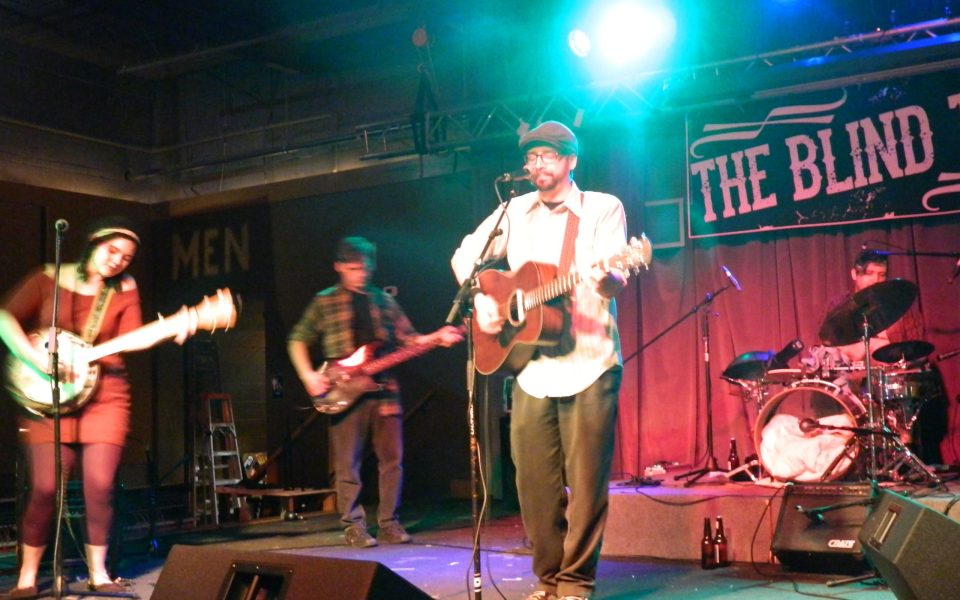by Jordan Green
Matty Sheets had been telling friends and bandmates all night that they were playing for an “elite” audience, and he didn’t know how right he was. Towards the end of his closing set with the Blockheads at the Blind Tiger in Greensboro on April 3, the bandleader thanked the dozen or so people who stuck it out, calling out fans, the band’s manager and the bartender by name.
Spotting a slender man with silver hair seated at a bar table near the back, he added, “And I’m sorry: I don’t know your name, sir.”
Emily Stewart, the banjo player, prompted him: “Allen.”
It was Allen Joines, the mayor of Winston-Salem..
Notwithstanding the appearance of a regional political luminary, albeit largely under the radar, the show had an intimate feel, almost as if the audience were sitting in on a rehearsal.
Playing together as a full band for the first time this year following accordion player Jessica Pennell’s hiatus to deal with her mother’s illness, the Blockheads started loose and gradually began to fire on all cylinders as the set progressed, venturing into new material that displayed a more emotionally direct and rhythmically assertive side.
“We got some s*** to be pissed off about, and so we’re hitting harder,” drummer Jerrod Smith reflected after the show.
Sheets has retired the electric guitar, returning to acoustic. The drums are muted so that the band can play un-mic-ed, if necessary. With fleet-fingered banjo picking by Stewart, rollicking piano by Stefan DiMuzio, a subtle but powerful low end by Doug Pike, the graceful interplay of accordion and flute by Pennell and Erin Hayes respectively, the Blockheads create a hootenanny of inspired revelry around Sheets’ thoughtful lyrics.
The Blockheads flash back to a time when bands tended to be a conglomeration of individuals fitting together whatever unique talents they might to possess rather than a stylized ensemble with prescribed roles for each player. A typical song begins slow with a reflective patina and builds to a manic rave-up, with unexpected melodic twists and time changes.
Matty Sheets & the Blockheads followed Paleface on the bill. A near-legendary songmonger who has toured up and down the East Coast for the past two decades, Paleface has inspired better-known acts like Beck and the Avett Brothers at various junctures in his career. Paleface the man’s act currently includes drummer and girlfriend Mo Samalot, whose propulsive percussion work complements his energetic guitar playing while her sweet vocalizations counterpoint his rough poetry.
Like the Blockheads, Paleface makes music more as a faith practice rather than as a performance event calibrated in intensity relative to the size of its audience. Paleface played with zeal for an audience, at least half of whom were members of the Blockheads. And Paleface found a ready partner when he drafted the audience into service for backup vocals for one number.
“Yeah, make me feel good,” he said, closing his eyes.
Paleface plays in the tradition of Hasil Adkins, making a primitive, homemade brand of rock and roll with acoustic guitar, harmonica and dynamic stage presence that achieves a lush pop sound through Mo’s contributions.
The relaxed setting provided Paleface with an opportunity to test-drive new material, much the same as the Blockheads.
“Let’s give it all we’ve got got,” Paleface urged Mo as they launched into a new song called “Going Out for Drinks,” a keening lament. Two other new songs variously evoked Neil Young (“We ain’t got a lot of time, what’s new?/ It’s out of the black, black and blue”) with Laurel Canyon harmony courtesy of Mo, and conjured forlorn honky-tonk poetry (“This life is really a test/ Who can know what will happen next?).
The opening set by Damn Frank fit the bill as an iconoclastic performance by a trio of Philadelphia natives relocated to Greensboro that tested new waters. Damn Frank draws inspiration from a more recent vintage than Paleface or the Blockheads — early ’80s punk and hardcore.
Their sound reconstructs essential spare parts into something that comes across as fresh and bracing, but seems to draw from a decade-long glorious underground slough of punk rock between the Sex Pistols and Nirvana. Damn Frank’s fast-and-loud mix of big, clunky bass notes, chugging guitar and dynamic percussion calls to mind a whole series of great bands like Mission of Burma and the Minutemen, with whom the young players in Damn Frank may or may not be familiar.
Altogether, it was a night of creative risk-taking, turnout be damned. And Matty Sheets was probably speaking for virtually everyone except Paleface, who have made a life on the road, when he addressed the audience as the hour approached 2 a.m.
“Thank you all for risking your jobs to be here,” he said. “We’re doing the same.”
Join the First Amendment Society, a membership that goes directly to funding TCB‘s newsroom.
We believe that reporting can save the world.
The TCB First Amendment Society recognizes the vital role of a free, unfettered press with a bundling of local experiences designed to build community, and unique engagements with our newsroom that will help you understand, and shape, local journalism’s critical role in uplifting the people in our cities.
All revenue goes directly into the newsroom as reporters’ salaries and freelance commissions.


Leave a Reply